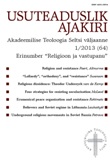Religious dissidence both resisted and protected by power: the case of the German Reformed Pietist minister Theodor Undereyck (1635–1693)
Religious dissidence both resisted and protected by power: the case of the German Reformed Pietist minister Theodor Undereyck (1635–1693)
Author(s): Jan van de KampSubject(s): Christian Theology and Religion
Published by: Akadeemiline Teoloogia Selts
Keywords: Church History
Summary/Abstract: It might normally be expected that political authorities would oppose the voice and influence of religious dissidence. However, recent research into Dutch dissident religious subcultures in the Early Modern era reveals that authorities protected or even supported propagators of religious dissidence due to particular social and political factors. This seems also to have been the case in regard to a propagator of religious dissidence in Germany: the minister Theodor Undereyck (1635–1693), who was the key founder of German Reformed Pietism. Until now, his biography has primarily been viewed from a theological perspective, with social and political historical aspects being neglected. Undereyck served as minister at Mülheim an der Ruhr (1660–1667), Kassel (1668–1670) and Bremen (1670–1693).In his first and last congregation, he introduced a range of renewals and launched proposals for reform in the church, such as the intensification of faith education and discipline, the introduction of a church government board consisting of ministers and members of the congregation that was intended to be independent of the political authorities, and devotional meetings for youth. Ecclesiastical and political authorities variously opposed or supported Undereyck; their reasons for so doing were variously religious, political or social in nature. At Mülheim, the Count opposed Undereyck: himself a Lutheran, he may have feared a decline in his control over the church and even social unrest. The Countess of Hesse-Kassel offered Undereyck a refuge; it appears she may have had an inclination towards Pietism. Undereyck’s ministerial colleagues at Bremen opposed him, because they may have feared that Undereyck would spread heretical doctrines, and that he would cause division and conflicts within the church or even the separation of certain groups from the church. They, too, may have been anxious that his activities would lead to social unrest. Some members of the city council protected and supported Undereyck; in the first instance, they may have had religious views concordant with Undereyck’s. Secondarily, their protection or support may also have been due to the fact that Undereyck was of a similarly privileged social standing as themselves. This factor also seems to have been decisive in determining whether propagators of Dutch dissident religious subcultureswere supported in or dismissed from the ministry. Thirdly, those city councillors who were favourably disposed may have considered Undereyck’s devotional meetings as an instrument to maintain social stability among the young. Fourthly, support for Undereyck might have been a tool for the city council to enhance its own control over the church, in which it competed with the board of city ministers. Finally, support for Undereyck might have been seen politically as furthering Bremen’s trade relations with England, a country and people to which Undereyck had religious connections.
Journal: Usuteaduslik Ajakiri
- Issue Year: 2013
- Issue No: 1 (63)
- Page Range: 27-44
- Page Count: 18
- Language: English

